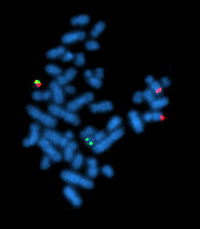
Photo from wikipedia
Background Gene fusions involving NTRK (neurotrophic receptor tyrosine kinase) genes result in the expression of chimeric TRK proteins with uncontrolled kinase activity, leading to oncogenic transformation and unrestrained cancer cell… Click to show full abstract
Background Gene fusions involving NTRK (neurotrophic receptor tyrosine kinase) genes result in the expression of chimeric TRK proteins with uncontrolled kinase activity, leading to oncogenic transformation and unrestrained cancer cell proliferation, which confers oncogenic potential across many histopathologies. Entrectinib is a central nervous system (CNS)-active, potent inhibitor of all TRK kinases, as well as ROS1. We present integrated efficacy and safety data for entrectinib in patients with locally advanced/metastatic NTRK fusion-positive (NTRK-FP) solid tumors enrolled in global (>150 sites, 15 countries) Phase I/II entrectinib trials (ALKA-372-001 [EudraCT 2012-000148-88], STARTRK-1 [NCT02097810], STARTRK-2 [NCT02568267]), focusing on a cohort of patients with NSCLC. Methods The analysis included patients with TRK inhibitor-naive solid tumors (with or without baseline CNS disease) harboring an NTRK fusion identified via nucleic acid-based diagnostic platforms. Tumor assessments were performed at week 4 and every 8 weeks thereafter. Disease burden was assessed per blinded independent central review (BICR) by RECIST v1.1. Primary endpoints (per BICR): overall response rate (ORR) and duration of response (DOR). Key secondary endpoints: progression-free survival (PFS), overall survival (OS) and safety Results In the total efficacy-evaluable population (n=54 adult patients with advanced/metastatic NTRK-FP solid tumors, median age 57.5 years, 59.3% female, 22.2% baseline CNS disease, >19 histopathologies across 10 cancer types), ORR (BICR) was 57.4% (95% CI 43.2-70.8), with 4 complete responses (7.4%); responses were seen in all tumor types. Median DOR: 10.4 months (95% CI 7.1-NR); median PFS: 11.2 months (95% CI 8.0-14.9); median OS: 20.9 months (95% CI 14.9-NR). In the cohort of patients with NTRK-FP NSCLC (n=10), ORR (BICR) was 70.0% (7/10; 7/7 adenocarcinoma NSCLC, 0/3 squamous cell or unclassified/undifferentiated NSCLC). In NSCLC patients with investigator-assessed baseline CNS disease (n=6), 4/6 had an intracranial response (2 complete, 2 partial); 1 had stable disease, and 1 was not evaluable. In the safety population (68 patients with NTRK-FP solid tumors who received at least 1 dose of entrectinib) most treatment-related adverse events (AEs) were grade 1-2; grade 3: 32.4% of patients, grade 4: 2.9% of patients; no grade 5 treatment-related AEs. AEs resulted in dose reduction in 39.7% of patients and discontinuation in 4.4% of patients. Conclusion In this integrated analysis of global multicenter clinical trials, entrectinib was well tolerated and induced clinically meaningful, durable systemic and CNS responses in patients with NTRK-FP solid tumors, including those with NSCLC. Citation Format: Robert Doebele, Luis Paz-Ares, Anna F. Farago, Stephen V. Liu, Sant P. Chawla, Diego Tosi, Collin M. Blakely, John C. Krauss, Darren Sigal, Lyudmila Bazhenova, Tom John, Benjamin Besse, Jurgen Wolf, Takashi Seto, Edna Chow-Maneval, Chenglin Ye, Brian Simmons, George D. Demetri. Entrectinib in NTRK-fusion positive (NTRK-FP) non-small cell lung cancer (NSCLC): Integrated analysis of patients enrolled in three trials (STARTRK-2, STARTRK-1 and ALKA-372-001) [abstract]. In: Proceedings of the American Association for Cancer Research Annual Meeting 2019; 2019 Mar 29-Apr 3; Atlanta, GA. Philadelphia (PA): AACR; Cancer Res 2019;79(13 Suppl):Abstract nr CT131.
Journal Title: Clinical Trials
Year Published: 2019
Link to full text (if available)
Share on Social Media: Sign Up to like & get
recommendations!